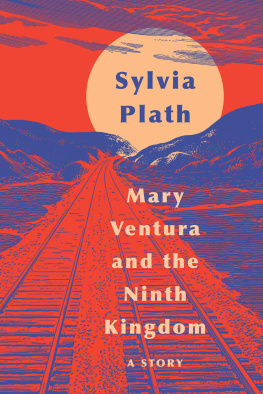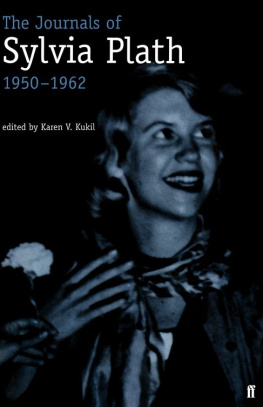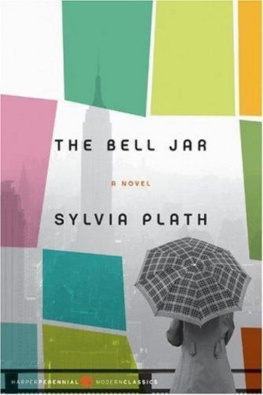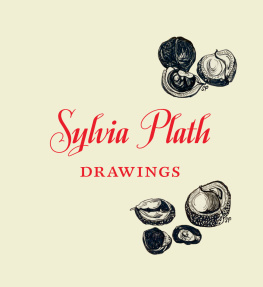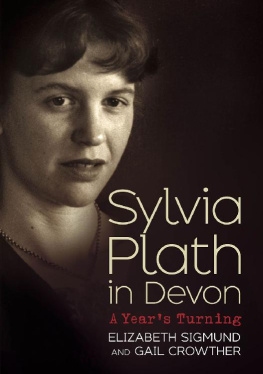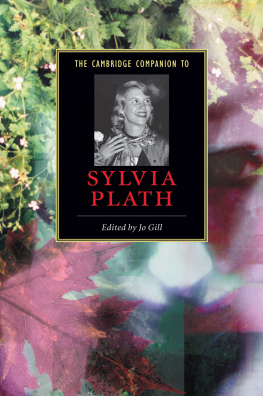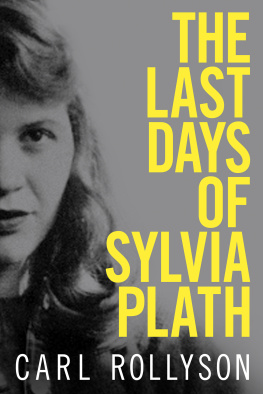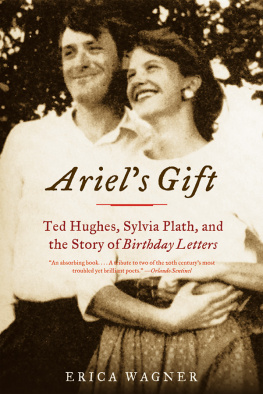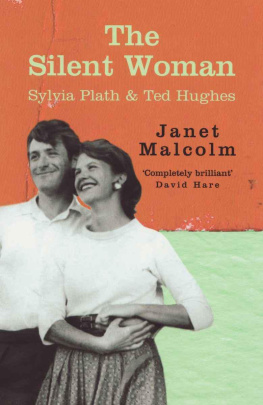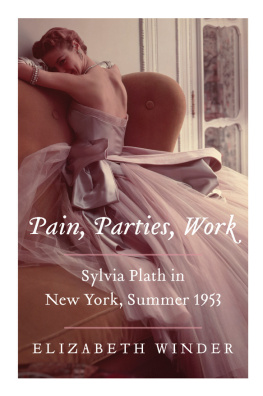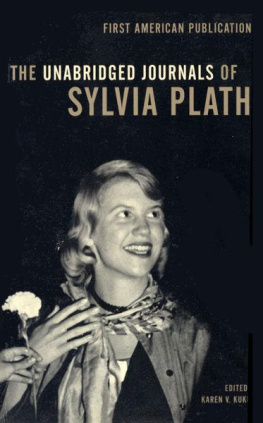Sylvia Plath - Mary Ventura and The Ninth Kingdom
Here you can read online Sylvia Plath - Mary Ventura and The Ninth Kingdom full text of the book (entire story) in english for free. Download pdf and epub, get meaning, cover and reviews about this ebook. year: 2018, genre: Art. Description of the work, (preface) as well as reviews are available. Best literature library LitArk.com created for fans of good reading and offers a wide selection of genres:
Romance novel
Science fiction
Adventure
Detective
Science
History
Home and family
Prose
Art
Politics
Computer
Non-fiction
Religion
Business
Children
Humor
Choose a favorite category and find really read worthwhile books. Enjoy immersion in the world of imagination, feel the emotions of the characters or learn something new for yourself, make an fascinating discovery.
- Book:Mary Ventura and The Ninth Kingdom
- Author:
- Genre:
- Year:2018
- Rating:5 / 5
- Favourites:Add to favourites
- Your mark:
- 100
- 1
- 2
- 3
- 4
- 5
Mary Ventura and The Ninth Kingdom: summary, description and annotation
We offer to read an annotation, description, summary or preface (depends on what the author of the book "Mary Ventura and The Ninth Kingdom" wrote himself). If you haven't found the necessary information about the book — write in the comments, we will try to find it.
Mary Ventura and The Ninth Kingdom — read online for free the complete book (whole text) full work
Below is the text of the book, divided by pages. System saving the place of the last page read, allows you to conveniently read the book "Mary Ventura and The Ninth Kingdom" online for free, without having to search again every time where you left off. Put a bookmark, and you can go to the page where you finished reading at any time.
Font size:
Interval:
Bookmark:
Mary Ventura and the Ninth Kingdom was written by Sylvia Plath in 1952, when she was a student at Smith College.
The real-life Mary Ventura was one of Plaths high-school friends. Plath had written an earlier story about her, as part of a creative writing assignment in her second year at Smith. That story, largely autobiographical, concerned a pair of old school friends who meet during the holidays, and shared nothing with this one except Venturas name.
In December 1952 she finished writing this story a vague symbolic tale, in her own description and submitted it for publication to Mademoiselle magazine, whose writing prize she had recently won. It was rejected.
Almost two years later, Plath revised the story, changing its title to Marcia Ventura and the Ninth Kingdom, making it less sinister, then curtailing it so significantly as to make it appear half-finished.
The version used here is the original rejected work the richest, and in Harpers view, the best. This is its first publication. All original spellings have been retained.
R ed neon lights blinked automatically, and a voice grated from the loudspeaker. Train leaving, on track three... train leaving for... train leaving...
I know that must be your train, Mary Venturas mother said. Im sure it is, dear. Hurry. Do hurry now. Have you your ticket?
Yes, mother, I do. But do I have to go right away? So soon?
You know how trains are, Marys father said. He looked anonymous in his gray felt hat, as if he were traveling incognito. You know how trains are. They dont wait.
Yes, father, I know.
The long black hand of the clock on the wall clipped off another minute. Everywhere there were people running to catch trains. Above them, the vault of the railroad station lifted like the dome of a huge cathedral.
Train leaving on track three... train leaving for... train leaving...
Hurry, dear. Mrs. Ventura took Mary by the arm and propelled her through the glittering marble halls of the railroad terminal. Marys father followed with her suitcase. Other people were hurrying to the train gate marked three. A conductor in a black uniform, his face shaded by the visor of his cap, herded the crowd in through the intricate black grillwork of the iron gate to the platform beyond.
Mother, Mary said, halting, hearing the colossal hissing of the engine on the sunken track. Mother, I cant go today. I simply cant. Im not ready to take the trip yet.
Nonsense, Mary, her father cut her short jovially. Youre just getting jittery. The trip north wont be an ordeal. You just get on the train and dont worry about another thing until you get to the end of the line. The conductor will tell you where to go then.
Come, now, theres a good girl. Marys mother tucked a strand of gilt blond hair up under her black velvet hat. It will be an easy trip. Everyone has to leave home sometime. Everyone has to go away sooner or later.
Mary weakened. Oh, well, all right. She let herself be led through the wrought iron gates, down the incline of the cement platform, where the air was thick with steam.
Extra, extra, newsboys were crying out headlines, selling papers at the doors of the train. Extra... ten thousand people sentenced... ten thousand more people...
There is nothing, Marys mother crooned, absolutely nothing for you to worry about. She pushed through the chaotic jostling crowds, and Mary followed in her wake, on to the next to the last car of the train. There was a long row of red plush seats, the color of wine in the bright light from the ceiling, and the seams of the car were riveted with brass nails.
How about this seat, here in the middle? Mr. Ventura didnt wait for an answer, but swung Marys suitcase up on the rack. He stood back. Mrs. Ventura touched a handkerchief to her painted red mouth, started to say something, stopped. There was, after all, nothing left to say.
Goodbye, Mary said with automatic fondness.
Goodbye, dear. Have a good time, now. Mrs. Ventura leaned to give Mary a vague, preoccupied kiss.
Mr. and Mrs. Ventura turned and began moving away, then, starting back down the aisle and retreating through the open doorway. Mary waved, but already they were gone and did not see. She took the seat by the window, slipping out of her red coat first and hanging it on the brass hook next to the windowframe. The rest of the passengers were almost all settled, now, but a few were still coming down the aisle, searching for seats. A lady in a blue jacket, carrying a baby wrapped in a soiled white blanket, paused at Marys seat for a minute, but then continued to the back of the car where there was more room.
Is this seat taken? The woman had come lurching down the aisle, puffing and red-faced, an earth-colored brown satchel in her hand. Her blue eyes crinkled up in a mass of wrinkles and her large, generous mouth stretched into a smile.
No, no ones sitting here. Mary could not help smiling back. She moved closer to the window and watched the woman take off her battered brown hat and her brown cloth coat.
Oof, sighed the woman, sinking heavily into the red plush seat, I almost thought I wouldnt make it this trip. Trains just about to start up.
The engine gave a snort, shuddered, and paused. Board... all board! a voice yelled from outside. The door to the car slammed shut with a final click, closing them all in.
This is it, the woman said. The departure. Steam rose up beyond the windowpane as the train slowly chugged down the track, and they could not see beyond the clouds of smoke and cinders.
The woman reached into her satchel and pulled out some knitting, the beginnings of a soft fabric of leaf-green wool.
Oh, Mary exclaimed. How pretty. Whats it going to be?
A dress, eventually. The woman appraised Mary with half-shut eyes. For a girl just about your size, too.
Im sure shell just love it.
The woman looked at Mary with an amused smile. I hope so, she said, and fell silent.
The train was still hurtling through the black tunnel when the squabble started on the seat in front of them. Two little boys were sitting there, across the aisle from their mother who was reading a magazine. They were playing with tin soldiers.
Give me that, the bigger boy with the black eyes said to his brother. Thats my soldier. You took my soldier.
I did not, the pale tow-headed fellow said. I did not take it.
You did too. I saw you. The older boy picked up a tin soldier and struck his brother on the forehead. There! Serves you right.
Blood oozed from a purpling bruise. The younger boy began to whimper. I hate you, he whined. I hate you.
The mother kept on reading her magazine.
Here, here, thats enough, said the woman beside Mary, leaning forward over the back of the seat. She reached out to dab gently at the blood on the young boys forehead with the hem of her white linen handkerchief. You boys ought to be ashamed of yourselves, making all that fuss for no reason at all. Over a couple of silly tin soldiers.
The little boys pouted sullenly at the interference and began to play quietly again.
The woman leaned back. I dont know whats the trouble with children these days. They seem to get worse and worse. She sighed, and took up her knitting again. Outside there was a sudden increase of light.
Look, said Mary. Weve come out of the tunnel.
The train had shot into the somber gray afternoon, and the bleak autumn fields stretched away on either side of the tracks beyond the cinder beds. In the sky hung a flat orange disc that was the sun.
The air is so thick and smoky! Mary exclaimed. Ive never seen the sun that strange color before.
Its the forest fires, the woman replied. The smoke always blows down from the north this time of year. Well be getting into more of it later on.
Font size:
Interval:
Bookmark:
Similar books «Mary Ventura and The Ninth Kingdom»
Look at similar books to Mary Ventura and The Ninth Kingdom. We have selected literature similar in name and meaning in the hope of providing readers with more options to find new, interesting, not yet read works.
Discussion, reviews of the book Mary Ventura and The Ninth Kingdom and just readers' own opinions. Leave your comments, write what you think about the work, its meaning or the main characters. Specify what exactly you liked and what you didn't like, and why you think so.

